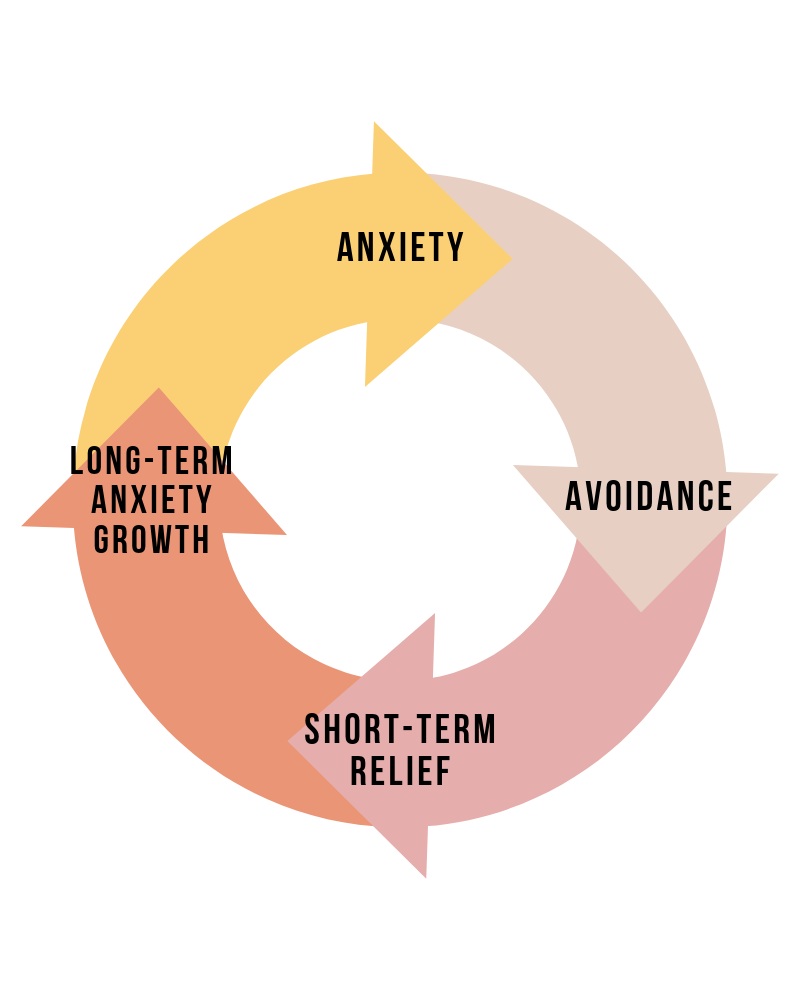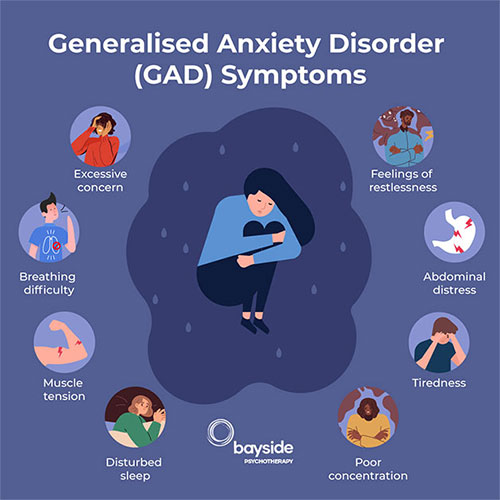Efficient Strategies in Therapy for Anxiety Disorder: A Path to Recuperation
When dealing with anxiousness problems, you might feel overwhelmed and not sure of where to turn. Efficient coaching strategies can lead the way for recuperation, providing you with the tools to navigate your challenges. From cognitive-behavioral methods to mindfulness techniques, each approach provides distinct advantages. Recognizing just how these approaches interact can make a significant distinction in your trip. What are the essential elements that will assist you towards lasting change?
Understanding Anxiousness Conditions: A Detailed Summary
When you think of stress and anxiety disorders, it's vital to identify that they incorporate a variety of conditions identified by too much anxiety or fear. These disorders can manifest in different ways, consisting of generalized anxiousness condition, panic problem, and social stress and anxiety condition. You could experience signs like rapid heart beat, sweating, or difficulty focusing. It prevails to really feel overwhelmed, and these feelings can interrupt daily life.Understanding the origin triggers of anxiousness is necessary. They can stem from genetics, brain chemistry, or ecological variables. You may find that specific scenarios cause your anxiety, making it essential to determine these triggers.
Cognitive Behavior Therapy (CBT): Reshaping Idea Patterns

Mindfulness and Relaxation Techniques: Growing Present-Moment Awareness
Mindfulness and leisure techniques assist you grow present-moment understanding, permitting you to handle anxiousness better. By concentrating on the present moment, you can break without the cycle of fear and rumination that typically fuels anxiousness. Start by exercising deep breathing exercises. Breathe in slowly with your nose, hold for a moment, after that exhale through your mouth. This easy technique can relax your mind and body.Engage in mindfulness meditation by setting aside a couple of minutes each day to observe your ideas without judgment. Take note of your breath, sensations, and the audios around you. You could also find worth in modern muscular tissue relaxation, where you strained and kick back each muscle group, advertising psychological and physical ease.Incorporating these methods right into your everyday regimen can develop a better sense of control, minimize stress and anxiety symptoms, and improve your general wellness. Keep in mind, uniformity is crucial to experiencing the benefits.
Direct Exposure Therapy: Encountering Concerns Progressively
Direct exposure therapy aids you encounter your anxieties gradually, allowing you to build confidence with time. By utilizing gradual exposure techniques, you can slowly confront what makes you anxious while developing reliable coping devices. This procedure not just decreases your anxiety yet additionally encourages you to take care of anxiousness better.
Gradual Exposure Methods
You can successfully lower anxiousness and gain back control over your life when you face your fears progressively. Steady direct exposure techniques entail encountering your concerns detailed, starting with much less frightening circumstances. You might start by envisioning the been afraid circumstance, after that advance to viewing videos or images connected to it. Ultimately, you can practice challenging the worry in the real world, but just when you feel ready. This approach enables you to build self-confidence as you move via each stage. Remember to rate yourself; hurrying can boost anxiety. Commemorate little triumphes along the road, as each advance empowers you. By constantly applying these strategies, you'll discover that your fears begin to lose their grasp on your mind.
Building Coping Mechanisms
Structure reliable coping systems is important for managing anxiousness, particularly as you encounter your concerns slowly via exposure treatment. Start by recognizing your particular fears and damaging them down right into workable actions. By doing this, you can gradually face each anxiety without ending up being overloaded. If you battle with social situations, start by practicing little communications, like welcoming a neighbor.Alongside steady direct exposure, include leisure techniques such as deep breathing or mindfulness to calm your mind before dealing with triggers. Keep a journal to track your development and commemorate tiny victories. Surround yourself with encouraging buddies or a specialist that can lead you. Bear in mind, it's a trip-- perseverance and persistence will strengthen your coping mechanisms, leading to greater resilience versus anxiousness.
Helpful Counseling: Building Count On and Connection
To successfully support somebody with anxiousness, browse around this site developing trust fund and connection is necessary from the extremely first session. You'll intend to create a secure area where they feel comfortable sharing their ideas and feelings without judgment. Active listening is vital; program real site passion in what they share. Recognize their feelings and confirm their experiences. It is necessary to be empathetic, as this helps construct a link and motivates openness.Be consistent in your approach and maintain confidentiality to further reinforce that trust fund. Usage open body language and make eye contact to convey your listening. Keep in mind, your persistence goes a lengthy method; building connection takes time, and it's vital to value their speed. By fostering this supportive setting, you'll encourage them to involve even more totally in the restorative process, making it simpler for them to explore their anxiousness and pursue healing.
Group Therapy: Shared Experiences and Collective Recovery
Team therapy can be an effective device for those taking care of anxiety problems, as it enables individuals to share their experiences and locate relief in the understanding of others. In this supportive environment, you can express your sensations without worry of judgment. Listening to others' stories can stabilize your own experiences, making you feel less alone in your struggle.Participating in team therapy aids you develop dealing strategies through shared understanding and understandings. As you listen to others, you may uncover new methods to tackle your stress and anxiety that you had not thought about before.Moreover, the cumulative recovery that occurs in these sessions can foster a feeling of area, advising you that you're not facing your difficulties alone.Building links with others who recognize your struggle can increase your self-confidence and inspiration to challenge your anxiety. Group therapy produces an area where development and recovery come to be a common trip, encouraging you to take actions towards recuperation.
Integrating Way Of Life Modifications: Alternative Strategies to Anxiousness Management
While treatment provides vital assistance, incorporating way of living adjustments can considerably boost your capacity to take care of anxiousness. Start by incorporating routine exercise right into your regimen. Workout launches endorphins, which can elevate your mood and decrease anxiety. Next off, take note of your diet plan. Taking in a well balanced diet regimen abundant in fruits, vegetables, and entire grains can favorably influence your psychological health. Don't ignore sleep-- objective for 7-9 hours per night, as go to these guys quality rest is essential for emotional regulation.Mindfulness methods, such as meditation or yoga, can also aid you stay grounded and existing. Think about alloting time daily to exercise these techniques. Limit high levels of caffeine and alcohol usage, as they can intensify anxiety signs and symptoms. By making these alternative changes, you develop a more powerful foundation for taking care of anxiousness, matching the benefits gained from treatment. Keep in mind, every small action depend on your path to recuperation.
Often Asked Questions
What Are the Usual Physical Signs of Stress And Anxiety Disorders?
Usual physical signs of anxiety problems consist of fast heart rate, lack of breath, muscle mass tension, sweating, and frustrations. You may likewise experience fatigue, dizziness, or gastrointestinal concerns, which can even more complicate your every day life.
For How Long Does Counseling for Anxiousness Usually Take?

Counseling for stress and anxiety normally takes a couple of weeks to several months, depending upon your specific needs and development. counselling for anxiety. You'll discover that routine sessions aid you create dealing techniques and get understandings right into your stress and anxiety
Can Stress And Anxiety Problems Be Completely Cured?

What Should I Do in a Panic Strike?
During a panic strike, concentrate on your breathing. Inhale deeply via your nose, hold for a moment, after that exhale gradually - counselling for anxiety. Ground yourself by calling items around you, and remind on your own it will pass
Exist Medications for Anxiety Problems?
Yes, there are a number of medications for anxiousness disorders, consisting of antidepressants and benzodiazepines. You should get in touch with a health care specialist to discover the appropriate treatment strategy tailored to your certain demands and scenarios for the best results. When you think regarding anxiety problems, it's important to identify that they include an array of conditions defined by too much concern or worry. These conditions can show up in different means, consisting of generalized anxiousness disorder, panic condition, and social anxiety problem. Building efficient coping mechanisms is essential for taking care of anxiety, specifically as you face your concerns gradually via exposure therapy. Team therapy can be an effective tool for those dealing with anxiousness conditions, as it allows individuals to share their experiences and discover relief in the understanding of others. As you pay attention to others, you might uncover new ways to tackle your anxiety that you hadn't taken into consideration before.Moreover, the cumulative recovery that takes place in these sessions can cultivate a feeling of community, reminding you that you're not facing your difficulties alone.Building connections with others who comprehend your struggle can improve your self-confidence and inspiration to challenge your anxiousness.